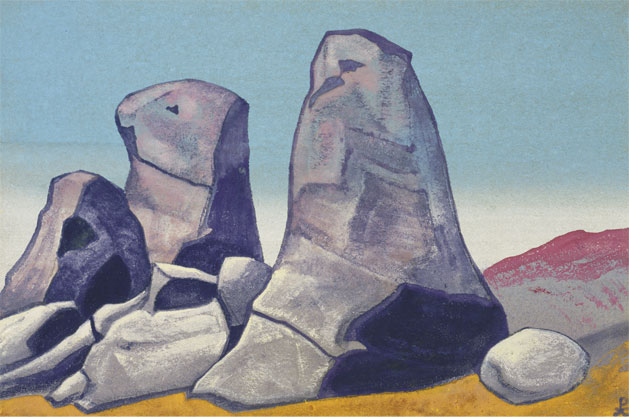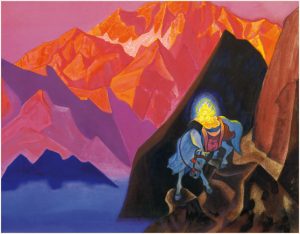We return once again to the Tibetan (Master D.K.), who describes in the remarks the aberration in the public consideration of the Masters of the Brotherhood and points out the reasons for it.
Quotations from Discipleship 1:
The Theosophical Society has taught the fact of the Masters, although H. P. Blavatsky has expressed (in a communication to the Esoteric Department) [778] that she bitterly regretted having done so. This teaching has been misinterpreted by later Theosophical leaders, and they have made certain fundamental errors. The Masters they portrayed were characterised by an impossible infallibility because the Masters were self-developing; the teaching given advocated a captivating interest in self-development and an intense concentration on personal unfoldment and liberation; the people referred to as initiates and elder disciples were quite mediocre, without any influence outside the Theosophical Society itself; total devotion to the Masters was also emphasised, a devotion to their personalities. It was also shown that these Masters interfered in the organisational life of the various occult groups which claimed to work under their direction. They were held responsible for the mistakes of the leaders of the groups, who sought to protect themselves by expressions such as: “The Master has instructed me to say, etc.”, “The Master wishes to see the following work done”, or “The Master wants the members to do this or that”. Those who obeyed were considered good members; those who refused to be interested and obedient were considered apostates. Inroads were constantly made into the freedom of the individual, and the weaknesses and ambition of the leaders were provided with an alibi. A. A. B., who was well aware of all this, refused to have anything to do with such a constantly repeated activity, for such is the history of almost all known occult groups which attract the attention of the public. Even if I had wished to work in such a way (which no one attached to the Hierarchy ever does) they would not have worked with me.
Years ago I said to A. A. B. (and also her own Master) that her main task as a disciple was to acquaint the public with the true nature of the Masters of Wisdom, and in this way to disarm the false impression which the public had gained. She did this to a certain extent, but not to the full extent intended. She shrank from the task in consequence of the bad name into which the whole matter had fallen through the misrepresentations of the various teachers and occult groups and the ridiculous claims issued about us by the ignorant. H. P. B., her predecessor, remarked in certain teachings sent out to the esoteric section of the Theosophical Society that she bitterly regretted ever having mentioned the Masters, their names and their work. A. A. B. has been of the same opinion. The Masters, as they have been described by the Theosophical Society, bear a faint resemblance to reality; much good has been done by this testimony to their existence, and much harm has been done by the ridiculous details which have sometimes been communicated. They are not as they have been portrayed. They do not issue orders to their followers (or rather worshippers) to do this or that, to found this or that organisation, nor do they imply that certain people are of extraordinary importance and [788] hierarchical rank. They know well that disciples, initiates and masters are recognised by their works, their deeds and their words; they must prove their rank by the work they perform.
The Masters work through their disciples in many organisations; they do not, through these disciples, enforce blind obedience on the members of the organisation, nor do they exclude from instruction those who do not agree with the principles or the interpretations of the leaders. They are not divisive or hostile to groups working under different disciples or other masters, and any organisation in which the masters have an interest would include all and exclude none. They do not have wars of words about personalities and endorse or reject that one just because the principles of an organised leader are supported or not. They are not flamboyant and uneducated people as portrayed by the mediocre leaders of many groups, nor do they choose men and women (as their committed disciples and prominent workers) who, even from a worldly point of view, are distinctly inferior or pretentious and practise the art of drawing attention to themselves. To be a probationary disciple, one may be a devoted person; then emphasis may be laid on purification and the attainment of an intelligent understanding of brotherhood and human need; to be an accepted disciple, working directly under the Masters and active in world-work, (with increasing influence) requires mental polarisation, development of the heart and a sense of right evaluation.
As A. A. B. knowing all this, and having observed the ill effects of the teaching usually given about the Masters, she has tried her utmost to present the true nature of the Hierarchy, its aims and its workers; she has endeavoured to lay the emphasis on Humanity and on world service, as the Hierarchy itself does, and not on a group of teachers who, even when they have overcome the ordinary personality problems and the experiences in the three worlds, are yet in the process of training and preparing themselves (under the instruction of the Christ) to enter the “Way of Higher Evolution”, as it is called. The name given to us by some disciples in Tibet gives a key to the point of our attainment. They call the Hierarchy the “Society of organised and enlightened thinkers’, enlightened by love and understanding, [789] by deep compassion and the ability to include everything, enlightened by the knowledge of the Plan; thinkers who strive to comprehend the purpose and who sacrifice their own immediate progress to help Humanity. These are Masters.





